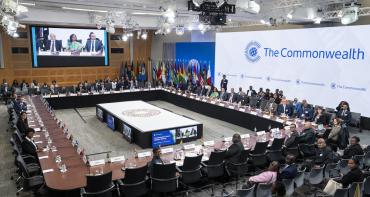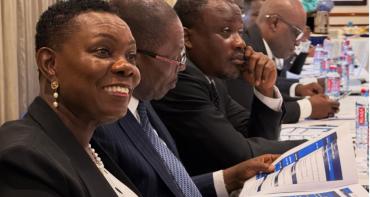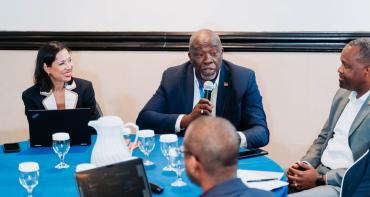Between 7-11 November, Lucas Rutherford attended the 37th Annual Technical Meeting of the Commonwealth Association of Tax Administrators (CATA), held in Bridgetown, Barbados. Read his blog.

As voters in the US presidential election weighed up candidates’ diverging positions on tax policy, further south on the shores of the Caribbean island of Barbados, 146 officials from across the globe were meeting to agree on how to build national tax systems that will buttress sustainable development.
Between 7 and 11 November, I attended the 37th Annual Technical Meeting of the Commonwealth Association of Tax Administrators (CATA), held in Bridgetown, Barbados. Whilst there has been an increase in regional tax administration networks in recent years, CATA remains the largest and most established global network of tax administrators and one of the few that bridges regions and levels of economic development.
The association, now boasting 46 members, was established by Commonwealth finance ministers in 1978 to help member countries develop effective tax administrations that promote sustainable development.
Held under the theme Enhancing Tax Compliance Through Strategic Alliances, this year’s conference focussed on ways that tax authorities can work more closely together to support effective operation of their tax systems. Given that the conference was held the week after the plenary meeting of the Global Forum on Transparency and Exchange of Information in Tax Matters in Tbilisi, Georgia, it was appropriate that a key area was the value of exchanging information between tax authorities to combat tax evasion.
Senior officials had the chance to share their experiences in putting in place the necessary administrative arrangements to facilitate existing international tax transparency standards and the new policy on automatic exchange of information. Listening to the experiences of Mauritius, a small island state, and India, one of the world’s largest states, I reflected on the truly global nature of the push to promote tax transparency. The value of these Commonwealth forums is that they enable seemingly disparate jurisdictions to share experiences and identify common ground.

Speaking alongside the deputy head of the Global Forum, Donal Godfrey, I had an opportunity to consider the challenges facing small state that host international financial centres (IFCs), often branded tax havens, to comply with international tax transparency standards. I see the firm commitment of many small state IFCs in meeting international tax transparency standards. But I also acknowledge the challenges facing smaller jurisdictions in keeping up with a rapidly evolving international agenda that is proving to be a challenge for even some of the world’s largest and best resourced bureaucracies.
The bigger picture, which now includes two blacklisting exercises, being undertaken by both the G20 and European Union, also highlights the bigger challenges facing many small state IFCs.
These issues were in sharp focus at this year’s Commonwealth Finance Ministers Meeting. So at the CATA meeting, I was able to emphasise the value of further strengthening the links between the Commonwealth’s political level and administrative networks. This, I argued, would help to give small and developing member countries a greater voice in evolving international tax issues, something that was also emphasised by Duncan Onduru, CATA’s executive director.
The final outcome statement called on the CATA Secretariat to act as a coordinating platform to amplify the Commonwealth’s voice and strengthen its participation in the contemporary debates and discussions on international taxation.
As the conference came to a close, delegates reflected on how they had had the opportunity to renew old and build new networks and share knowledge. They were treated to a video on Ghana - next year’s host of the CATA annual meeting. With the meeting moving from the shores of the Caribbean to the shores of the Gulf of Guinea and the recognition of the importance of cross-border collaboration in combatting tax evasion, which is likely to continue to grow, what is clear is that Commonwealth networks – administrative and policy alike – will continue to play an important role in helping to support a stronger international tax system. This in turn will help to bolster sustainable development in all countries.

Heads of delegation at the Meeting.



